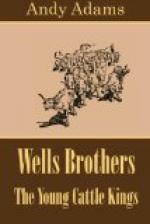The watering of a trail herd is important. Mere opportunity to quench thirst is not sufficient. The timid stand in awe of the strong, and the excited milling cattle intimidate the weak and thirsty. An hour is the minimum time, during which half the herd may drink and lie down, affording the others the chance to approach without fear and slake their thirst.
The acting foreman signaled in his herd. The beeves around the water were aroused, and reluctantly grazed out on their course, while the others came on with a sullen stride that thirst enforces. The previous scene of contentment gave way to frenzy. The heavy beeves, equally select with the vanguard, floundered into the pools, lowed in their joy, drank to gorging, fought their fellows, staggered out of the creek, and dropped to rest in the first dust or dry grass.
Priest trimmed his own beeves and remuda. A third herd appeared, when he and the acting foreman culled over both horses and cattle, and sent the second herd on its way. Each of the three advance herds must reach the Republican the following day, and it was scant two o’clock when the third one trailed out from the Beaver. With mature cattle there were few cripples, and the day ended with an addition to the little ranch of the promised horses and a few tender-footed beeves. There were two more herds of heavy beef cattle to follow, which would arrive during the next forenoon, and the old foreman remained over until the last cattle, intended for army delivery, had passed the ranch.
The herd never fails. Faith in cattle is always rewarded. From that far distant dawn when man and his ox started across the ages the one has ever sustained the other. The two rear beef herds promptly reached the Beaver the next morning, slaked their thirst, and passed on before noon.
“This lets me out as your guest,” said Priest to the boys, when the last herd was trimmed. “Bob Quirk will now follow with six herds of contract cattle. He’s the foreman of the second herd of beeves, but Mr. Lovell detailed him to oversee this next division across to the Platte. Forrest will follow Quirk with the last five herds of young steers, slated for the old man’s beef ranch on the Little Missouri. That puts our cattle across the Beaver, but you’ll have plenty of company for the next month. Mr. Lovell has made a good talk for you boys around Dodge, and if you’ll give these trail drovers this water, it will all come back. As cowmen, there are two things that you want to remember—that it’ll rain again, and that the cows will calve in the spring.”
Priest had barely left the little ranch when Bob Quirk arrived. Before dismounting, he rode around the pools, signaled in a wagon and remuda, and returned to the tent.
“This is trailing cattle with a vengeance,” said he, stripping his saddle from a tired horse. “There has been such a fight for water this year that every foreman seems to think that unless he reaches the river to-day it’ll be dry to-morrow. Five miles apart was the limit agreed on before leaving Dodge, and here I am with six herds—twenty thousand cattle!—within twenty miles of the Beaver. For fear of a stampede last night, we threw the herds left and right, two miles off the trail. The Lord surely loves cattle or the earth would have shook from running herds!”




